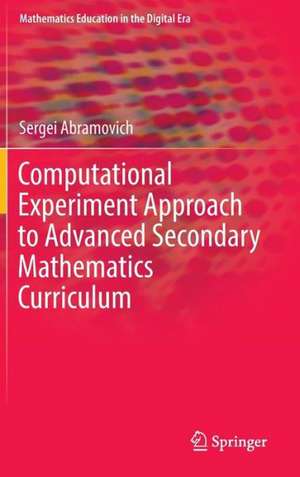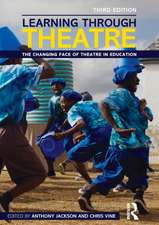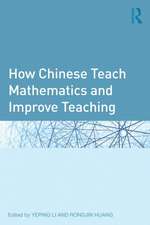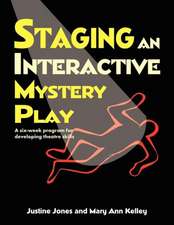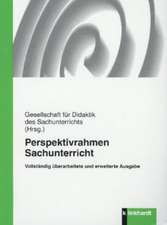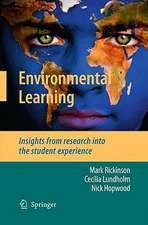Computational Experiment Approach to Advanced Secondary Mathematics Curriculum: Mathematics Education in the Digital Era, cartea 3
Autor Sergei Abramovichen Limba Engleză Hardback – 22 mai 2014
| Toate formatele și edițiile | Preț | Express |
|---|---|---|
| Paperback (1) | 642.68 lei 6-8 săpt. | |
| SPRINGER NETHERLANDS – 27 sep 2016 | 642.68 lei 6-8 săpt. | |
| Hardback (1) | 649.06 lei 6-8 săpt. | |
| SPRINGER NETHERLANDS – 22 mai 2014 | 649.06 lei 6-8 săpt. |
Din seria Mathematics Education in the Digital Era
- 15%
 Preț: 642.68 lei
Preț: 642.68 lei - 24%
 Preț: 739.43 lei
Preț: 739.43 lei - 18%
 Preț: 782.42 lei
Preț: 782.42 lei - 15%
 Preț: 644.82 lei
Preț: 644.82 lei - 18%
 Preț: 1127.15 lei
Preț: 1127.15 lei - 18%
 Preț: 959.36 lei
Preț: 959.36 lei - 18%
 Preț: 952.26 lei
Preț: 952.26 lei - 24%
 Preț: 804.90 lei
Preț: 804.90 lei - 18%
 Preț: 990.93 lei
Preț: 990.93 lei -
 Preț: 438.10 lei
Preț: 438.10 lei - 18%
 Preț: 953.03 lei
Preț: 953.03 lei - 18%
 Preț: 889.92 lei
Preț: 889.92 lei - 24%
 Preț: 825.42 lei
Preț: 825.42 lei - 24%
 Preț: 752.34 lei
Preț: 752.34 lei -
 Preț: 360.15 lei
Preț: 360.15 lei - 20%
 Preț: 573.76 lei
Preț: 573.76 lei -
 Preț: 394.29 lei
Preț: 394.29 lei -
 Preț: 389.88 lei
Preț: 389.88 lei - 15%
 Preț: 649.54 lei
Preț: 649.54 lei - 18%
 Preț: 1117.50 lei
Preț: 1117.50 lei - 18%
 Preț: 1112.78 lei
Preț: 1112.78 lei
Preț: 649.06 lei
Preț vechi: 763.60 lei
-15% Nou
Puncte Express: 974
Preț estimativ în valută:
124.19€ • 129.67$ • 102.79£
124.19€ • 129.67$ • 102.79£
Carte tipărită la comandă
Livrare economică 04-18 aprilie
Preluare comenzi: 021 569.72.76
Specificații
ISBN-13: 9789401786218
ISBN-10: 9401786216
Pagini: 344
Ilustrații: XV, 325 p. 252 illus.
Dimensiuni: 155 x 235 x 24 mm
Greutate: 0.66 kg
Ediția:2014
Editura: SPRINGER NETHERLANDS
Colecția Springer
Seria Mathematics Education in the Digital Era
Locul publicării:Dordrecht, Netherlands
ISBN-10: 9401786216
Pagini: 344
Ilustrații: XV, 325 p. 252 illus.
Dimensiuni: 155 x 235 x 24 mm
Greutate: 0.66 kg
Ediția:2014
Editura: SPRINGER NETHERLANDS
Colecția Springer
Seria Mathematics Education in the Digital Era
Locul publicării:Dordrecht, Netherlands
Public țintă
ResearchCuprins
Preface.- 1. Theoretical foundations of computational experiment approach to secondary mathematics.- 2. One-variable equations and inequalities: the unity of computational experiment and formal demonstration.- 3. Computationally supported study of quadratic functions depending on parameters.- 4. Computational experiment approach to equations with parameters.- 5. Inequalities with parameters as generators of new meanings.- 6. Computational experiments in trigonometry.- 7. Advancing stem education through temp: Geometric probabilities.- 8. Exploring topics in elementary number theory through a computational experiment.- References.
Recenzii
“This is a comprehensive, well-written, and meticulously organized text on computing technology for secondary mathematics teacher education.” (Steven C. Althoen, zbMATH 1295.97001, 2014)
Textul de pe ultima copertă
This book promotes the experimental mathematics approach in the context of secondary mathematics curriculum by exploring mathematical models depending on parameters that were typically considered advanced in the pre-digital education era. This approach, by drawing on the power of computers to perform numerical computations and graphical constructions, stimulates formal learning of mathematics through making sense of a computational experiment. It allows one (in the spirit of Freudenthal) to bridge serious mathematical content and contemporary teaching practice. In other words, the notion of teaching experiment can be extended to include a true mathematical experiment. When used appropriately, the approach creates conditions for collateral learning (in the spirit of Dewey) to occur including the development of skills important for engineering applications of mathematics. In the context of a mathematics teacher education program, this book addresses a call for the preparation of teachers capable of utilizing modern technology tools for the modeling-based teaching of mathematics with a focus on methods conducive to the improvement of the whole STEM education at the secondary level. By the same token, using the book’s pedagogy and its mathematical content in a pre-college classroom can assist teachers in introducing students to the ideas that develop the foundation of engineering profession.
Caracteristici
Extents the notion of experimental mathematics to include pre-college curriculum Introduces a pedagogy of computer experimentation with mathematical models depending on parameters Provides teacher candidates with research-like experience in mathematics and its pedagogy Presents modeling activities in both technology-enabled and technology-immune approach Presents original examples of experimental mathematics pedagogy Includes supplementary material: sn.pub/extras
